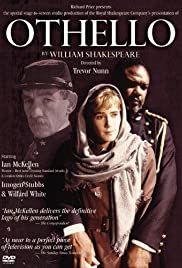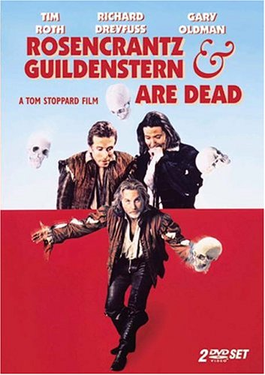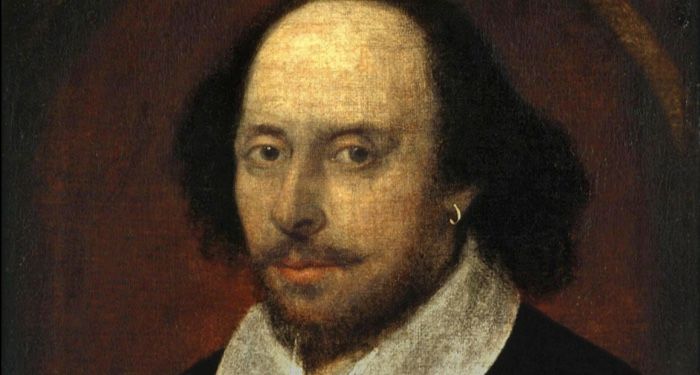
A Definitive List of the Best Shakespeare Film Adaptations
There is nothing I miss more right now than live theatre. At the beginning of lockdown, I took advantage of the National Theatre’s pro-shot productions that they released on YouTube. (Their production of A Midsummer Night’s Dream with Gwendoline Christie as Titania/Hippolyta is one for the history books.) St. Ann’s Warehouse also made the Phyllida Lloyd–directed all-female Shakespeare trilogy available for streaming. However, watching these theatre productions from my apartment made me depressed and miss the theatre even more, so I turned to the cinematic universe of Shakespeare film adaptations.
William Shakespeare’s plays are nearly all based on myths, history, and other stories that he brought to life with his fantastic words—there are 410 adaptations on film and television of his works. A lot of film adaptations of his work attempt to re-contextualize these plays into the contemporary moment, while others focus on doing the plays as written in the “original” time period. There are merits to both methods, but it’s not really about the set design—it all depends on the strength of the actors. There are movies set in modern times where an actor might deliver Shakespeare speeches in a deadly dull fashion, and movies set in Shakespearean times where the dull scenes are brought to life by excellent acting and cinematography.
Although I’m a bit of a Shakespeare purist (in terms of the language, not the all-male cast element), I think some of the best Shakespearean film adaptations just give Shakespeare a “story by” credit and go in a completely different direction. The ‘90s and early 2000s were a big time for these kinds of adaptations that use Shakespeare as a launching pad, from Disney to raunchy teen comedies. There are plenty of interpretations for every kind of fan. These films are perfect for a nostalgic watch night or a missing-theatre sort of night.
Original Language Shakespeare Adaptations
Othello Directed by Trevor Nunn (1990)
With Willard White as Othello and Ian McKellen as Iago, this is a must-see production. Adapted from a stage version, this is very clearly a play that was reformatted for television release. They move the setting to Cyprus, and all of the characters look like they stepped out of the American Civil War. If you’re like me and first found Ian McKellen as Gandalf and Magneto, it’s extremely exciting to see him as an intensely conniving villain. Sir Willard White is a similarly electrifying actor who brings a nuanced performance to the role of Othello. What else can I say? British actors are generally very good at Shakespeare.
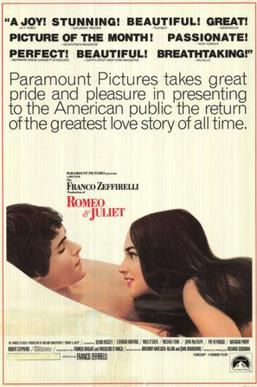
Romeo and Juliet Directed by Franco Zeffirelli (1968)
This version sets itself in the period of the original play and hews closely to the classic ideal of a Shakespeare production. However, it was sort of an outlier at the time because it was the first production to use teenage actors close to the age that they were supposed to be portraying, hence its major popularity among teenagers. Leonard Whiting and Olivia Hussey have amazing chemistry and speak the lines with a kind of ease that makes the movie come alive.
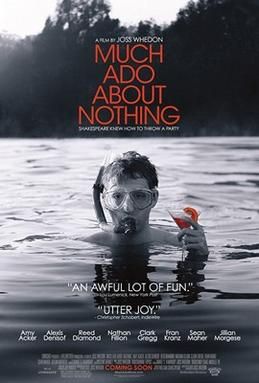
Much Ado About Nothing Directed by Joss Whedon (2012)
Although Whedon has been continuously chipping away at his reputation for the past several years, this adaptation of “Much Ado” still numbers among my favorites. Shot in black and white in 12 days, the movie has an intimacy that often missing when film productions go hard on the period set design. Set in modern times with a bunch of favorite actors from Firefly, Avengers, and Angel, the movie sticks close to the original characters and language. Since the actors seem so comfortable with each other, it really does feel like a weekend trip where everyone gets a little drunk and loose. There’s very little capital-A acting (outside of the one scene where it’s revealed that Hero might have had sex) so it’s a perfect cozy couch watch.
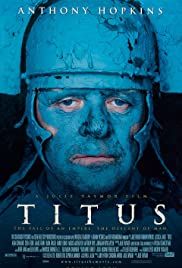
Titus Directed by Julie Taymor (1999)
Shakespeare’s bloodiest revenge play (Titus Andronicus) gets the surrealist treatment from Julie Taymor. Starring Anthony Hopkins, Jessica Lange, Alan Cumming, and a bunch of puppets, the movie goes hard on the generational trauma of war and how it breeds constant bloodshed, even off the battlefield. Taymor also plays with presentation, confusing her audience about the time period and setting. There isn’t a happy ending waiting at the end of all of this bloody business, but it’s a good tragedy to watch on a dark and stormy night.
Shakespeare as a Starting Point

Ran Directed by Akira Kurosawa (1985)
If you’re in the mood for a cinephile, extra dramatic, war tragedy sort of movie, this is the one for you. Adapted from King Lear, Kurosawa’s interpretation has three sons who turn against their aging warlord father, Ichimonji Hidetora. Despite the gender swap, the story hews pretty closely to the tragic story of the original play. Kurosawa focuses in on the horrors of war and the general chaos that power causes. The samurai imagery is also hugely influential—it’s one of those movies that rewards many watches, like Shakespeare rewards rereads.
Rosencrantz & Guildenstern Are Dead Directed by Tom Stoppard (1990)
Based on the play by Tom Stoppard, this film adaptation takes the perspective of the side characters who die offstage in Hamlet. If you’ve ever mocked Hamlet for having wild plans and no follow through, this is probably the movie for you. Rosencrantz (Gary Oldman) and Guildenstern (Tim Roth) have big parts to play in Hamlet, but it’s mostly offstage. This is an absurdist take on Hamlet and the horror of existence in general. Most of what happens in the play occurs in between Hamlet scenes from Rosencrantz’s and Guildenstern’s perspective, so it’s perfect for true Hamlet heads.

The Lion King Directed by Roger Allers and Rob Minkoff (1994)
This cartoon lion epic is the definitive Hamlet interpretation of the 20th century. That might be an overstatement, but this is certainly among the most widely known. Moving the drama of Elsinore to the Pride Lands, the movie starts with a bit more explanation about the kingdom and why we should care about the father Mufasa’s death that kicks Simba into action, as opposed to starting with Hamlet’s depression. Jeremy Irons as Scar takes the Claudius character in both hilarious and evil directions, and he’s afforded more explanation for his evil plan in the iconic song “Be Prepared.” For this adaptation, they chose to focus mostly on the family drama and eschew most of Hamlet’s failed plans in Simba’s journey—he fights Scar and the hyenas directly in the first place instead of testing Scar with a play (although I would have loved to see Simba set up a play to incite guilt in Scar and prove his evil).
She’s the Man Directed by Andy Fickman (2006)
Twelfth Night gets a pretty faithful adaptation in the form of this high school comedy. The cross-dressing premise leads to delightfully overdone explorations of boys vs. girls, especially in Amanda Bynes’s performance as Viola Hastings. This movie that furthered the rise of Channing Tatum as Duke Orsino, which is a great service. Viola impersonates her brother Sebastian for two weeks in order to play soccer at Illyria, and her rise to popularity as her brother is also pretty fun and campy. At the end, the point is that Viola can not only play soccer as well as the boys, but also that being a boy for a little bit helped her be more comfortable as a girl.
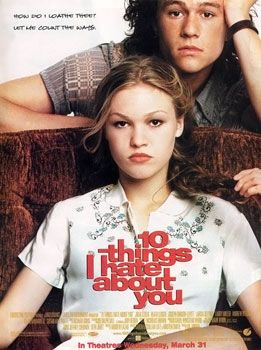
10 Things I Hate About You Directed by Gil Junger (1999)
This reimagining of The Taming of the Shrew is much easier and more pleasant to watch than a straight reading of the play. Patrick Verona (Health Ledger) is a far more handsome and sympathetic version of Petruchio, and Kat (Julia Stiles) gets to have more adventures and explanations about what she wants and who she is outside of her relationship and prickly personality. It’s a teen classic for good reason, with some great Shakespeare nerd jokes thrown in.
Shakespeare Regenerated
There are so many Shakespeare adaptations that you could do lists ranking the adaptations of individual plays and occupy yourself for months. What is frustrating about cinematic Shakespeare adaptations is that they’re still pretty white and heterosexual. Experimental theatre tends to push the gendered and racial boundaries of Shakespeare. It’s pretty easy for a small theatre company to put on a diverse, prop-spare production of a Shakespeare play, since they’re all in the public domain and don’t require licensing fees. Like my dad always says, constraint is the soul of creativity, which is why so many theatrical Shakespeare productions are fun. The movies are helping ease the lack of theatre. Shakespeare movies are a different beast and do require a fair amount of reimagining to work as movies instead of just filmed plays, and there are so many great ones to choose from. Although I didn’t include Kenneth Branagh on this particular list, all of his Shakespeare adaptations are extremely well done.
Now that William Shakespeare has received the COVID-19 vaccine, who knows will Shakespeare adaptations will go? I imagine there will be a Shakespeare adaptation set in a house or quarantine pod where all of the actors slowly degenerate into madness while speaking the Bard’s famous words. If you still have the Shakespeare itch, dive into his many amazing puns and a whole series of articles about great Shakespeare retellings.



